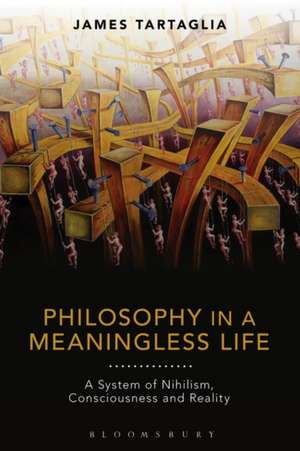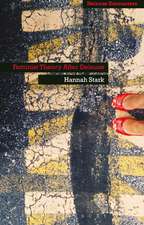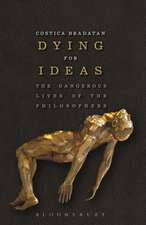Philosophy in a Meaningless Life: A System of Nihilism, Consciousness and Reality
Autor James Tartagliaen Limba Engleză Paperback – 14 dec 2016
| Toate formatele și edițiile | Preț | Express |
|---|---|---|
| Paperback (1) | 256.85 lei 6-8 săpt. | |
| Bloomsbury Publishing – 14 dec 2016 | 256.85 lei 6-8 săpt. | |
| Hardback (1) | 773.45 lei 6-8 săpt. | |
| Bloomsbury Publishing – 16 dec 2015 | 773.45 lei 6-8 săpt. |
Preț: 256.85 lei
Preț vechi: 295.06 lei
-13% Nou
Puncte Express: 385
Preț estimativ în valută:
49.15€ • 50.78$ • 40.89£
49.15€ • 50.78$ • 40.89£
Carte tipărită la comandă
Livrare economică 20 martie-03 aprilie
Preluare comenzi: 021 569.72.76
Specificații
ISBN-13: 9781350017511
ISBN-10: 1350017515
Pagini: 232
Dimensiuni: 156 x 234 x 19 mm
Greutate: 0.33 kg
Ediția:NIPPOD
Editura: Bloomsbury Publishing
Colecția Bloomsbury Academic
Locul publicării:London, United Kingdom
ISBN-10: 1350017515
Pagini: 232
Dimensiuni: 156 x 234 x 19 mm
Greutate: 0.33 kg
Ediția:NIPPOD
Editura: Bloomsbury Publishing
Colecția Bloomsbury Academic
Locul publicării:London, United Kingdom
Caracteristici
Uses key philosophical topics including consciousness, nihilism, science, time, transcendence to address the question of whether human life is meaningful
Notă biografică
James Tartaglia is Senior Lecturer in Philosophy at Keele University, UK
Cuprins
Preface Introduction 1. The Meaninglessness of Life 2. A Survey of Misguided Coping Strategies: Does Nihilism Ruin Your Life? 3. On What Philosophy Is 4. The Problem of Consciousness 5. Consciousness: The Transcendent Hypothesis 6. Time 7. Universals 8. Nihilism, Transcendence, and Philosophy Bibliography Index
Recenzii
Tartaglia's book is an intriguing contribution to the ongoing philosophical discussion regarding the meaning (or meaninglessness) of life, written in a lucid and engaging style.
A fascinating book. It is refreshing to read a well-written book of contemporary philosophy that puts the question of the meaning of life at its very centre and at the very centre of philosophy itself. The argument rests on a huge amount of reading and learning, lightly worn. And, in particular, in highlighting the difference between meaning (significance) in life and the meaning of life Tartaglia has done any philosopher who thinks about either of these things a great favour. He makes a very persuasive case that recent discussions have equivocated between these two different concepts. And he may well be right that this equivocation has been motivated by a fear of nihilism.
Tartaglia's discussion is subtle, and displays both historical sensitivity and attention to debates in recent literature.
A superb and original work. Tartaglia addresses head-on the question of the meaning of life - which he calls 'the keystone of philosophy' - and gives an uncompromising nihilist answer to it. But rather than turning to gloom and despair, he shows how nihilism is, in a certain sense, neither good nor bad; and that it can be used to address some central traditional questions of philosophy: about consciousness, time and universals. Elegantly written and very readable, this is a unique work of philosophy that deserves a wide readership.
Tartaglia's fascinating book on nihilism argues that if life as a whole lacks meaning, then so does fretting about it: as a belief, nihilism calls for neither chagrin nor champagne. Like a philosophical Franz Klammer, Tartaglia slaloms adroitly round delusions that flag our downhill path from absence to annihilation. On the way he has engaging things to say, among much else, about absurdity, the nature of mind, the tedium of childhood, and the notion that human life might have been created by aliens as reality TV entertainment.
A fascinating book. It is refreshing to read a well-written book of contemporary philosophy that puts the question of the meaning of life at its very centre and at the very centre of philosophy itself. The argument rests on a huge amount of reading and learning, lightly worn. And, in particular, in highlighting the difference between meaning (significance) in life and the meaning of life Tartaglia has done any philosopher who thinks about either of these things a great favour. He makes a very persuasive case that recent discussions have equivocated between these two different concepts. And he may well be right that this equivocation has been motivated by a fear of nihilism.
Tartaglia's discussion is subtle, and displays both historical sensitivity and attention to debates in recent literature.
A superb and original work. Tartaglia addresses head-on the question of the meaning of life - which he calls 'the keystone of philosophy' - and gives an uncompromising nihilist answer to it. But rather than turning to gloom and despair, he shows how nihilism is, in a certain sense, neither good nor bad; and that it can be used to address some central traditional questions of philosophy: about consciousness, time and universals. Elegantly written and very readable, this is a unique work of philosophy that deserves a wide readership.
Tartaglia's fascinating book on nihilism argues that if life as a whole lacks meaning, then so does fretting about it: as a belief, nihilism calls for neither chagrin nor champagne. Like a philosophical Franz Klammer, Tartaglia slaloms adroitly round delusions that flag our downhill path from absence to annihilation. On the way he has engaging things to say, among much else, about absurdity, the nature of mind, the tedium of childhood, and the notion that human life might have been created by aliens as reality TV entertainment.






